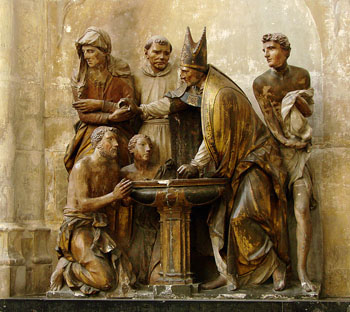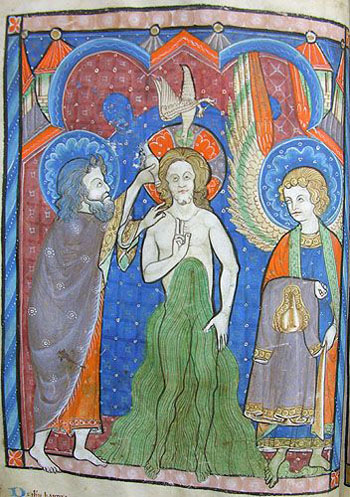About the Church
 |
 |
 |
 |
 |
 |
 |
The Sacrament of Baptism - VI
The Three Forms of Baptism
After presenting the Catholic doctrine on Baptism, I believe it is important to mention a particularity of this sacrament that the Church has defined countless times: This sacrament exists in three forms called Baptism of Water, Baptism of Blood and Baptism of Repentance or Desire.
 It is a truth of revealed faith that God is good. (1) He does not seek to condemn to Hell those who had no opportunity to know his law. In this regard St. Thomas Aquinas taught:
It is a truth of revealed faith that God is good. (1) He does not seek to condemn to Hell those who had no opportunity to know his law. In this regard St. Thomas Aquinas taught:
“It is not imputed as a sin to man, if he fails to know what he is unable to know. Consequently ignorance of such like things is called ‘invincible,’ because it cannot be overcome by study. For this reason such like ignorance, not being voluntary, since it is not in our power to be rid of it, is not a sin: wherefore it is evident that no invincible ignorance is a sin.” (2)
In this regard Pope Pius IX in his Encyclical Quanto conficiamur wrote:
"There are, of course, those who are struggling with invincible ignorance about our most holy religion. Sincerely observing the natural law and its precepts inscribed by God on all hearts and ready to obey God, they live honest lives and are able to attain eternal life by the efficacious virtue of divine light and grace.
"Because God knows, searches and clearly understands the minds, hearts, thoughts and nature of all, His supreme kindness and clemency do not permit anyone at all who is not guilty of deliberate sin to suffer eternal punishments." (3)
On the other hand, in the next paragraph of the same encyclical Pius IX stipulated an important distinction about contumacy when he said:
"Also well known is the Catholic teaching that no one can be saved outside the Catholic Church [extra Ecclesiam nulla sallus]. Eternal salvation cannot be obtained by those who oppose the authority and statements of the same Church and are stubbornly separated from the unity of the Church and also from the successor of Peter, the Roman Pontiff, to whom 'the custody' of the vineyard has been committed by the Savior.” (4)
Three forms of the same Baptism
Having made this clear, we must analyze in greater depth what the Church teaches about the economy of salvation on this particular issue.
When the Church talks about Baptism of water, blood, and repentance or desire, is she talking about three different baptisms? No; she is talking about three forms of the same Baptism.
 St. Thomas taught that “the other two Baptisms are included in the Baptism of water, which derives its efficacy both from Christ’s Passion and from the Holy Ghost. Consequently, for this reason the unity of Baptism is not destroyed.” (5)
St. Thomas taught that “the other two Baptisms are included in the Baptism of water, which derives its efficacy both from Christ’s Passion and from the Holy Ghost. Consequently, for this reason the unity of Baptism is not destroyed.” (5)
In other words, Baptism of desire and Baptism of blood are called Baptisms only in comparison, insofar as they supply the principal effect of the sacrament of Baptism, namely the grace that remits sins.
To make this point very clear, there is no better way than to quote the Doctor Angelicus who, centuries ago, set out this matter fully. I believe that the following words of his Summa explain the matter perfectly:
“No man obtains eternal life unless he be free from all guilt and debt of punishment. Now this plenary absolution is given when a man receives Baptism or suffers martyrdom: for which reason is it stated that martyrdom "contains all the sacramental virtue of baptism, i.e., as to the full deliverance from guilt and punishment. …
“The sacrament of Baptism is said to be necessary for salvation insofar as man cannot be saved without, at least, baptism of desire; ‘which, with God, counts for the deed.’ (Augustine, Enarr. in Ps. 57)” (6)
Also, a letter from the Holy Office from August 8, 1949, to Archbishop Richard J. Cushing of Boston makes plain what was said above with the following words:
“But it must not be thought that any kind of desire of entering the Church suffices that one may be saved. It is necessary that the desire by which one is related to the Church be animated by perfect charity. Nor can an implicit desire produce its effect, unless a person has supernatural faith: For he who comes to God must believe that God exists and is a rewarder of those who seek Him (Heb. 11:6).” (D. 1641, 1677)
It is clear, then, that in order to be saved without Baptism of water there must be an act of perfect charity including, at least implicitly, the will to do all things necessary for salvation. Indeed, the Council of Trent insists in that a perfect contrition by charity reconciles man to God. (7)
In this regard, the Council of Trent makes this good synthesis of the position of the Holy See on the Baptism of blood and the Baptism of desire:
“The same must be said of the Church, as a general means of salvation. That is why for a person to obtain his salvation, it is not always required that he be de facto incorporated into the Church as a member, but he must at least be united to the Church through desire or hope.
“However, it is not always necessary that this hope be explicit as in the case of catechumens. When one is in a state of invincible ignorance, God accepts an implicit desire, thus called because it is implicit in the soul's good disposition, whereby a person desires to conform his will to the will of God.” (8)
In addition to the statement of the editor of TIA that I fully share and recommend to the reader (here), I would like to complement this topic with other important quotes that demonstrate the antiquity of the teaching of the Church on the validity of the Baptism of desire and the Baptism of blood.
 According to St. Ambrose, the desire of Baptism, like martyrdom, replaces Baptism of water. He taught:
According to St. Ambrose, the desire of Baptism, like martyrdom, replaces Baptism of water. He taught:
“But I hear that you grieve because he did not receive the sacrament of Baptism. Tell me now, what else is in us, if not will, if not desire? He, in very truth had this wish that, before he came to Italy, he should be initiated into the Church, and he indicated that he wanted to be baptized by me very soon, and that is why he thought I had to be called before everything else.
"Did he not obtain the grace which he desired? Did he not obtain what he asked for? Certainly, because he asked for it, he obtained it. But the just man, if he be prevented by death, shall be in rest (Wis. 4:7)… But if people are absolved in their own blood, then this man’s piety and desire absolved him.” (9)
St. Bernard recalled that with God the intention counts as the act when the act is excluded by necessity. (10)
There was the case of a Jew who, at the point of death, baptized himself since he lived among Jews and could not get anyone to do it. Pope Innocent III said that it was required that someone else must perform the ceremony on him, but he also declared:
“If, however, he had died immediately, he would have rushed to the heavenly home without delay because of the faith of the sacrament (propter sacramenti fidem)," even though he had not truly received "the sacrament of Faith (fidei sacramentum).” (11)
These are some documents of authority that teach the possibility of the baptism of desire accepted as an exception to the rule that everyone should be baptized with water.
To be continued


St. Ambrose administers the Baptism of Water to St. Augustine
“It is not imputed as a sin to man, if he fails to know what he is unable to know. Consequently ignorance of such like things is called ‘invincible,’ because it cannot be overcome by study. For this reason such like ignorance, not being voluntary, since it is not in our power to be rid of it, is not a sin: wherefore it is evident that no invincible ignorance is a sin.” (2)
In this regard Pope Pius IX in his Encyclical Quanto conficiamur wrote:
"There are, of course, those who are struggling with invincible ignorance about our most holy religion. Sincerely observing the natural law and its precepts inscribed by God on all hearts and ready to obey God, they live honest lives and are able to attain eternal life by the efficacious virtue of divine light and grace.
"Because God knows, searches and clearly understands the minds, hearts, thoughts and nature of all, His supreme kindness and clemency do not permit anyone at all who is not guilty of deliberate sin to suffer eternal punishments." (3)
On the other hand, in the next paragraph of the same encyclical Pius IX stipulated an important distinction about contumacy when he said:
"Also well known is the Catholic teaching that no one can be saved outside the Catholic Church [extra Ecclesiam nulla sallus]. Eternal salvation cannot be obtained by those who oppose the authority and statements of the same Church and are stubbornly separated from the unity of the Church and also from the successor of Peter, the Roman Pontiff, to whom 'the custody' of the vineyard has been committed by the Savior.” (4)
Three forms of the same Baptism
Having made this clear, we must analyze in greater depth what the Church teaches about the economy of salvation on this particular issue.
When the Church talks about Baptism of water, blood, and repentance or desire, is she talking about three different baptisms? No; she is talking about three forms of the same Baptism.

The Doctor Angelicus set out the matter of Baptism clearly in his Summa
In other words, Baptism of desire and Baptism of blood are called Baptisms only in comparison, insofar as they supply the principal effect of the sacrament of Baptism, namely the grace that remits sins.
To make this point very clear, there is no better way than to quote the Doctor Angelicus who, centuries ago, set out this matter fully. I believe that the following words of his Summa explain the matter perfectly:
“No man obtains eternal life unless he be free from all guilt and debt of punishment. Now this plenary absolution is given when a man receives Baptism or suffers martyrdom: for which reason is it stated that martyrdom "contains all the sacramental virtue of baptism, i.e., as to the full deliverance from guilt and punishment. …
“The sacrament of Baptism is said to be necessary for salvation insofar as man cannot be saved without, at least, baptism of desire; ‘which, with God, counts for the deed.’ (Augustine, Enarr. in Ps. 57)” (6)
Also, a letter from the Holy Office from August 8, 1949, to Archbishop Richard J. Cushing of Boston makes plain what was said above with the following words:
“But it must not be thought that any kind of desire of entering the Church suffices that one may be saved. It is necessary that the desire by which one is related to the Church be animated by perfect charity. Nor can an implicit desire produce its effect, unless a person has supernatural faith: For he who comes to God must believe that God exists and is a rewarder of those who seek Him (Heb. 11:6).” (D. 1641, 1677)
It is clear, then, that in order to be saved without Baptism of water there must be an act of perfect charity including, at least implicitly, the will to do all things necessary for salvation. Indeed, the Council of Trent insists in that a perfect contrition by charity reconciles man to God. (7)
In this regard, the Council of Trent makes this good synthesis of the position of the Holy See on the Baptism of blood and the Baptism of desire:
“The same must be said of the Church, as a general means of salvation. That is why for a person to obtain his salvation, it is not always required that he be de facto incorporated into the Church as a member, but he must at least be united to the Church through desire or hope.
“However, it is not always necessary that this hope be explicit as in the case of catechumens. When one is in a state of invincible ignorance, God accepts an implicit desire, thus called because it is implicit in the soul's good disposition, whereby a person desires to conform his will to the will of God.” (8)
In addition to the statement of the editor of TIA that I fully share and recommend to the reader (here), I would like to complement this topic with other important quotes that demonstrate the antiquity of the teaching of the Church on the validity of the Baptism of desire and the Baptism of blood.

Even Christ did not administer His own Baptism
“But I hear that you grieve because he did not receive the sacrament of Baptism. Tell me now, what else is in us, if not will, if not desire? He, in very truth had this wish that, before he came to Italy, he should be initiated into the Church, and he indicated that he wanted to be baptized by me very soon, and that is why he thought I had to be called before everything else.
"Did he not obtain the grace which he desired? Did he not obtain what he asked for? Certainly, because he asked for it, he obtained it. But the just man, if he be prevented by death, shall be in rest (Wis. 4:7)… But if people are absolved in their own blood, then this man’s piety and desire absolved him.” (9)
St. Bernard recalled that with God the intention counts as the act when the act is excluded by necessity. (10)
There was the case of a Jew who, at the point of death, baptized himself since he lived among Jews and could not get anyone to do it. Pope Innocent III said that it was required that someone else must perform the ceremony on him, but he also declared:
“If, however, he had died immediately, he would have rushed to the heavenly home without delay because of the faith of the sacrament (propter sacramenti fidem)," even though he had not truly received "the sacrament of Faith (fidei sacramentum).” (11)
These are some documents of authority that teach the possibility of the baptism of desire accepted as an exception to the rule that everyone should be baptized with water.
To be continued
- Mk 10:18
- Thomas Aquinas, Summa Theologiae, I-II q.76, a.2.
- Pius IX. Encyclical Quanto conficiamur, n. 7, apud DS 2866.
- Ecumenical Council of Chalcedon in its letter to Pope Leo
- Thomas Aquinas, Summa Theologiae, III. q.66, a.11.
- Ibid. q.68, a.2, ad 2,3.
- Council of Trent, Sessio XIV, cap. IV, apud Dz 1678.
- Ibid, apud DS 3870 .
- St. Ambrose, De Obitu Valentiniani consolatio, in JP Migne, Patrologia Latina, II, pp. 1374-1375, n. 51-53.
- Ibid, De Baptismo, II, 7
- Cf. Epistle Debitum Officii Pontificalis, August 28, 1206 (DS 788).

Posted March 29,
2019















